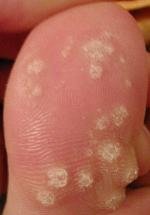
The placebo effect is so well known and documented that it is included in almost all respectable scientific researches involving healthcare.
In case you are not familiar, the placebo effect happens when a patient believes that the treatment or medicine they are receiving is actually having a beneficial affect on their body. When in reality, the medicine or treatment has no known medicinal affect on the body whatsoever. The irony of this is that it might just be the belief of a patient that is getting them better when they are taking real medicine and not the medicine itself.
Placebo and Warts
In the 1927 experiments of Swiss dermatologist Bruno Bloch, significant results were found in the treatment of warts with placebo. Bloch had an elaborate procedure of blindfolding the patient, using a loud machine, painting purple dye on the warts and telling the patient not to touch the warts until the dye wore off. Bloch ended up having about a 50% cure rate with his elaborate placebo procedures.
There are actually numerous studies showing the effectiveness of placebo for wart removal and of course all the scientific studies involving placebo always show some improvement or change for the people that are given a placebo.
The flip side to this coin is the opposite of placebo known as nocebo. This is where the patient believes that something they are taking or doing is causing harm or worsening their condition, when in reality it has no known effect on their condition.
A study known as the Framingham heart study showed that women who believed they were prone to heart disease were 4 times as likely to die of heart disease as those with similar risk factors who didn't think they were prone to heart disease. [Voelker, Rebecca. "Nocebos Contribute to a Host of Ills." Journal of the American Medical Association 275 no. 5 (1996): 345-47. ]
Arthur Barsky, a psychiatrist at Boston's Brigham and Women's Hospital, found in a recent review of the nocebo literature that patient expectation of adverse effects of treatment or of possible harmful side-effects of a drug, played a significant role in the outcome of treatment (Barsky et al. 2002).
Once again we see that what we believe to be true has an effect on our body.